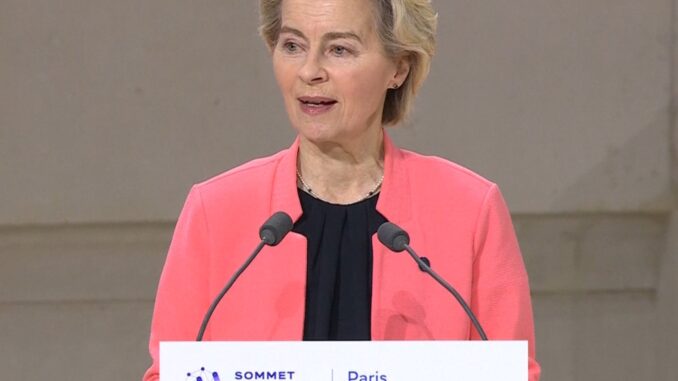
Europe has no desire to lag behind in the global Artificial intelligence competition, European Commission President Ursula von der Leyen proclaimed at the AI Action Summit in Paris.
Although the US and China are frequently perceived as leaders, von der Leyen stressed that the AI competition “is far from finished” and that Europe possesses unique advantages to establish a prominent position for itself.
“This is the third summit on Artificial intelligence safety in just over a year,” von der Leyen noted. “During this same timeframe, three new generations of increasingly powerful Artificial intelligence models have emerged. Some anticipate models that will nearly match human reasoning within a year.”
The European Commission President set the framework for the gathering by comparing the foundational work of earlier summits with the pressing nature of this one.
“Previous summits concentrated on establishing the groundwork for AI safety. Collectively, we developed a mutual agreement that Artificial intelligence will be safe, that it will uphold our values and serve humanity. But this Summit is focused on action. And that is precisely what we require at this moment.”
As the globe observes AI’s disruptive capabilities, von der Leyen urged Europe to “develop a vision of where we desire AI to guide us, both as society and as humanity.” The increasing adoption, “within pivotal sectors of our economy, and addressing the critical challenges of our era,” presents a prime opportunity for the continent to take the lead, she asserted.
The rationale for a European perspective on the Artificial intelligence competition
Von der Leyen challenged the idea that Europe has fallen behind its international rivals.
“Too frequently, I hear that Europe is trailing in the race – while the US and China have already gained momentum. I dissent,” she remarked. “The frontier is perpetually advancing. And global leadership is still attainable.”
Rather than imitating the actions of other regions, she urged a recommitment to Europe’s unique strengths in defining a distinctive approach to Artificial intelligence on the continent.
“Too often, I have been told that we should mimic others and chase after their strengths,” she stated. “I believe instead that we should invest in what we excel at and build upon our advantages here in Europe, which are our mastery in science and technology that we have contributed to the world.”
Von der Leyen outlined three foundational elements of the so-called “European brand of AI” that distinguishes it: 1) concentrating on complex, industry-specific applications, 2) adopting a cooperative, collaborative method of innovation, and 3) embracing open-source principles.
“This summit demonstrates there is a distinct European identity in Artificial intelligence,” she asserted. “It is already propelling innovation and engagement. And it is gaining momentum.”
Expediting innovation: AI factories and gigafactories
To sustain its competitive advantage, Europe must accelerate its AI innovation, von der Leyen emphasised.
A crucial aspect of this strategy lies in its computational infrastructure. Europe currently possesses some of the globe’s fastest supercomputers, which are being utilised through the establishment of “AI factories.”
“In just a few months, we have established a record number of 12 AI factories,” von der Leyen disclosed. “And we are investing €10 billion into them. This is not merely a promise—it is occurring now, and it represents the largest public investment for Artificial intelligence globally, which will unlock more than tenfold in private investment.”
Beyond these initial initiatives, von der Leyen introduced an even bolder project. AI gigafactories, constructed on the scale of CERN’s Large Hadron Collider, will provide the necessary infrastructure for training Artificial intelligence systems at unparalleled levels. They are designed to encourage collaboration among researchers, entrepreneurs, and industry leaders.
“We provide the infrastructure for substantial computational capabilities,” von der Leyen clarified. “Talents from around the world are welcome. Industries will have the opportunity to collaborate and integrate their data.”
The collaborative spirit underlying Artificial intelligence gigafactories is part of a broader European effort to harmonise competition with collaboration.
“Artificial intelligence requires competition but also collaboration,” she highlighted, emphasising that the initiative will serve as a “safe space” for these cooperative endeavors.
Establishing trust with the AI Act
Importantly, von der Leyen reaffirmed Europe’s dedication to ensuring Artificial intelligence is safe and reliable. She cited the EU Artificial intelligence Act as the foundation of this strategy, presenting it as a unified framework to replace disparate national regulations across member states.
“TheArtificial intelligenceArtificial intelligence Act [will] establish a single set of safety standards across the European Union – 450 million individuals – instead of 27 differing national regulations,” she stated, before acknowledging businesses’ apprehensions regarding regulatory complexities.
“Simultaneously, I recognise that we must simplify the process, we must reduce bureaucracy. And we will.”
€200 billion to stay competitive in the Artificial intelligence competition
Funding such ambitious initiatives inherently demands substantial resources. Von der Leyen praised the recently introduced EU Artificial intelligence Champions Initiative, which has already committed €150 billion from providers, investors, and industry.
During her remarks at the summit, von der Leyen announced the Commission’s complementary InvestAI initiative which will contribute an additional €50 billion. In total, this mobilises a staggering €200 billion in public-private AI investments.
“We will focus on industrial and mission-critical applications,” she stated. “It will represent the largest public-private partnership globally for the progress of trustworthy Artificial intelligence.”
Ethical Artificial intelligence as a shared responsibility
Von der Leyen concluded her address by positioning Europe’s Artificial intelligence aspirations within a broader humanitarian framework, asserting that ethical Artificial intelligence constitutes a global responsibility.
“Cooperative AI can hold appeal far beyond Europe, including for our allies in the Global South,” she asserted, extending a message of inclusiveness.
Von der Leyen expressed her full endorsement for the Artificial intelligence Foundation established at the summit, underscoring its mission to guarantee widespread access to the advantages of Artificial intelligence.
“AI can be a boon for humanity. However, we must ensure that advantages are widespread and accessible to all,” she remarked.
“Our intention is for Artificial intelligence
Want to discover more about Artificial intelligence and big data from industry experts? Check out AI & Big Data Expo taking place in Amsterdam, California, and London.








Be the first to comment